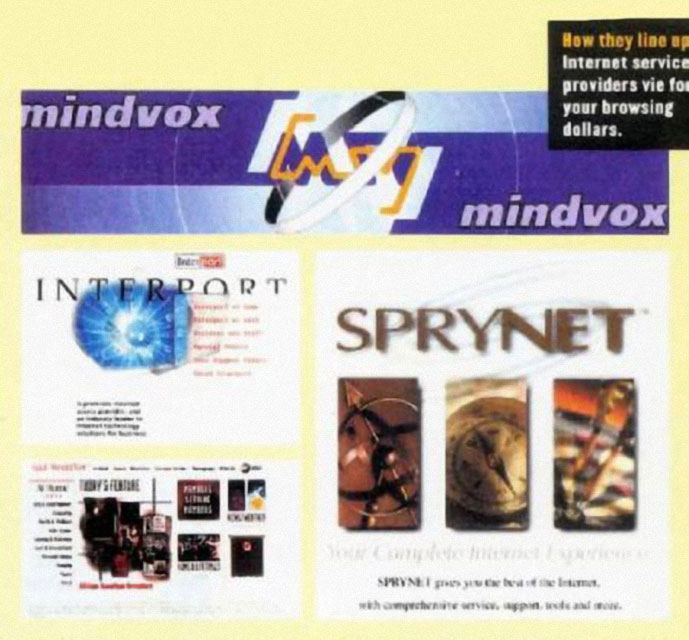

Internet Service Providers
By Matthew Fenton and Charles Runnette

You might think the entry of AT&T into the Internet-service-provider business means there’s now one clear choice. You would be wrong. Although AT&T’s deal is attractive, it’s not compelling enough to obliterate the competitions.
First off, what not to do: Don’t use one of the big proprietary online services (CompuServe, America Online, and Prodigy) as your staging ground for the Internet. Although Prodigy has a decent Internet browser (provided you’re using Windows; Prodigy doesn’t have a Macintosh-compatible browser), the Big Three all have serious flaws as ISPs (which is what Internet service providers are called in computer-world shorthand). For the moment, it’s difficult to draw conclusions about the fourth, Microsoft Network, because it is still struggling to reinvent itself as a gateway to the Internet, a retreat from last year’s misbegotten launch as an AOL-like proprietary service.
Of the big guys, America Online rates the lowest as an ISP. Its America Online Browser (the only option at present, unless you’re prepared to tinker with the settings deep inside your computer’s brain) is slow-moving and crashes frequently, in our experience. (AOL also offers limited, censored access to newsgroups, which is where some of the Internet’s more, uh, unconventional material is.) CompuServe’s Mosaic browser–the slight outdated predecessor to the Netscape browser–is a bit better, but at this time, it’s available only for Windows. The good news, though, is that with some effort Windows users can run Netscape, or almost any other browser, over CompuServe accounts. (For the record, NEW YORK Magazine’s online edition is currently carried on CompuServe.) CompuServe and America Online may or may not improve dramatically when they incorporate, as both plan to, Netscape and Microsoft’s browser, Internet Explorer, into their Mac and Windows services.
The worst sin committed by the three major services is, however, charging you by the hour for Internet access. Even relatively pricey ISP boutiques generally offer unlimited access for a flat fee (in the range of $20 to $35 per month), but the hourly charges levied by the Big Three, with moderate usage, easily can run to $100 a month.

Which brings us to AT&T’s WORLDNET SERVICE (800-400-1447). The announcement that the telecommunications giant is launching a new Internet service rocked the ISP universe five weeks ago. The terms are genuinely alluring; Five free hours of Internet access each month, additional hours at $2.50–or unlimited access for $19.95 per month–if you’re one of AT&T’s 80 million residential customers. (If AT&T isn’t your long-distance carrier, unlimited access is $24.95 a month.) This is a great deal, and a shrewd move on AT&T’s part–it can use cheap Internet access as an inducement to switch your long-distance business to AT&T. Say SYN-er-gy.
But MCI now offers identical terms for its INTERNETMCI (800-550-0927), and there’s no penalty if you aren’t an MCI residential customer. What’s more unlike the neophyte AT&T, MCI has been in the ISP business–albeit keeping a low profile–for about two years. By going with MCI you can avoid AT&T’s growing pains (like having to wait four to six weeks for software, and nearly as long for a live operator to answer the phone and explain the service to you). MCI’s customer-service and technical-support operations, which we put through their paces recently, compare favorably with AT&T’s. Both AT&T’s WorldNet and internetMCI use a customized version of Netscape: they’re shipping a version 1.22 now, and AT&T says it will begin shipping it’s own version 2.0–which accommodates bells and whistles such as Shockwave and Java–in June. AT&T enjoys a slight advantage in local access numbers; its WorldNet is a local call for 80% of the U.S. population. But MCI whose network handles over 40 percent of the Internet’s traffic including a portion of AT&T’s Internet traffic, expects to surpass AT&T’s nationwide local-access reach within months.
The dark horse among national providers, however, is SPRYNET (800-SPRYNET). CompuServe’s newly spun-off Internet division charges the same price as WorldNet and internetMCI for unlimited access but also offers two economy options: $4.95 for three hours or less and $9.95 for seven hours or less. In both cases, additional hours are $1.95 each, compared with a $2.95-an-hour Internet surcharge on regular CompuServe. SpryNet also covers an astonishing 92% of the country (and much of Europe) with local telephone access. While we don’t recommend SpryNet for Mac users until the software is available, the Windows version comes with the Mosaic browser and can easily be adopted to support Microsoft’s Internet Explorer or Netscape.
But there are reasons–like content, quality of service, and unique technical frills–to consider signing up with one of the locally based providers rather than a national ISP.
The best of the bunch: INTERPORT (989-1128), isn’t cheap or flashy; it’s simply the most reliable and well-run. Two qualities not to be underestimated in an industry fraught with busy signals and disconnections. Superior technical support is available by phone during the week, and you won’t grow old waiting for someone to answer your call. If you prize sturdiness above all else, sign up for Interport at $25 for a virtually inexhaustible 60 hours per month.
MINDVOX (989-2418) is populated by cyberpeople with a gonzo sensibility. The topics on MindVox’s 120-plus bulletin boards range from “Schadenfreude” to “UFO Sightings.” At $25 a month for unlimited access, MindVox costs about $5 a month more than national services, but Voxers swear the aggressively alt.culture discussion areas justify the cost.
PANIX (741-4400) is remarkable among New York Web Providers in that it offers subscribers access to a Unix shell, which lets you customize what you see when you dial up the Web. This feature lets you do basic stuff, like jumping directly to a particular site every time you log on, and perform arcane wizardry, such as funking up the presentation other users see when they finger you (“Fingering” is geek-speak for requesting all available information about another user.) If you’re into this sort of thing, Panix may be worth the hefty $35 a month for unlimited access.
April 1996, NEW YORK






Recent Comments